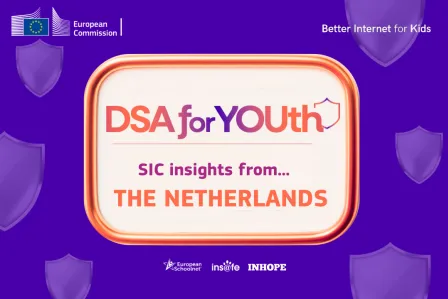This article is part of the campaign DSA for YOUth - Protecting minors by design, focusing on the DSA guidelines for the protection of minors under the DSA, including the age verification (AV) and age-appropriate (AA) measures, and translating these rules into clear, practical, and jargon-free resources. In this insight series, we explore how different Safer Internet Centres are working at the national level to raise awareness about the DSA and how it impacts the everyday lives of young people, their parents or caregivers, and teachers and educators.

Under the Digital Services Act (DSA), trusted flaggers are responsible for detecting potentially illegal content and alerting online platforms. They are entities designated by the national Digital Services Coordinators (DSCs). In this article, we learn more about the work of Offlimits, the helpline strand of the Dutch Safer Internet Centre, in its role as a trusted flagger.
Establishing the process
Offlimits was designated as the first trusted flagger in the Netherlands in July 2025. The designation was built on the trusted partnership Offlimits has built with various online platforms throughout the years, and the expertise and competence shown in recognising and reporting illegal content.
Following the official designation, various measures were taken internally to ensure compliance with the trusted flagger reporting process. The first and foremost step was to familiarise Offlimits helpline counsellors with the DSA and its implications for their work. As such, four DSA training sessions were organised for the helpline team.
During these trainings, helpline counsellors were provided with a detailed understanding of the DSA, including its scope, the trusted flagger mechanism under Article 22, and how this new mechanism would affect their existing reporting procedures. Additionally, an extensive explanation of the Dutch Criminal Code and private law articles applicable to filing reports was provided and practiced. Lastly, the trainings also included in-depth discussions of several cases as examples, during which helpline counsellors discussed about how they would interpret each case and whether the reported platform falls under the scope of the DSA, determining its legality and how they would file a report for these cases. These discussions encouraged lively debate and helped strengthen the team’s understanding and confidence in filing reports under the DSA.
Equally, during these discussions, several questions were also raised regarding the difficulty in assessing some cases, in particular cases related to doxing or slander, as there can be some ambiguity in the interpretation. Another point of concern was the amount of additional work to file a notice and takedown (NTD) report, as a so called “four-eye principle” (a control mechanism requiring a second person to approve a critical action, decision, or transaction before it can be finalised) is required to determine the illegality of cases, adding workload to the already busy helpline workflow.
Reporting processes
In terms of the reporting process, nothing has significantly changed as both the helpline and hotline functions within Offlimits were already established as ‘trusted partners’ with various online platforms before the trusted flagger designation. In practice, this means being able to directly report illegal content or send NTD orders to platforms. Following the trusted flagger designation, a dedicated trusted flagger email address was set up for the helpline to send reports to online platforms. Most platforms were responsive and cooperative when informed about Offlimit’s designation and the new email address, with just a few needing additional clarification on the procedures.
When a case arises that may qualify for trusted flagger reporting, helpline counsellors first assess whether the reported platform falls within the scope of the DSA. The case is then reviewed with another colleague using the four-eye principle outlined above; this is an internal procedure established to ensure the accuracy of trusted flagger reports. Once at least two helpline counsellors confirm that the content is illegal under Dutch or EU legislation, the helpline submits the report either through the dedicated trusted flagger email address or via the platform’s reporting portal, where available. Over the past three months, this reporting process has gone smoothly, with most platforms responding to the reports. In October 2025, however, a first formal notification was sent to the Digital Service Coordinator (DSC) regarding a very large online platform (VLOP, as designated under the DSA) for non-compliance in terms of slow response time and being non-responsiveness to subsequent follow-ups.
What’s next?
Looking forward, Offlimits aims to establish a more efficient reporting process and strengthen its collaboration with online platforms through its role of trusted flagger. Regular training sessions will be organised for helpline counsellors alongside regular team discussions on assessing the illegality of reports and contacts to ensure alignment.
In addition, the case management system will be enhanced by integrating it with data collection tools. This will enable more automated data collection, such as NTDs sent, for annual transparency reporting and provide valuable insights into reporting mechanisms, helping to identify areas for further improvement.
Interested in learning more about the DSA?
If you are interested in more, explore the DSA for YOUth toolkit to learn how the Digital Services Act (DSA) protects minors by design. There, you will find a family-friendly booklet explaining the DSA guidelines on what online platforms should do to keep kids and teens safe online, easy-to-read explainers, a quiz, and other resources.
Interested in learning more about activities in the Netherlands?
Find more information about the work of the Dutch Safer Internet Centre, including its awareness raising, helpline, hotline, and youth participation services – or find similar information for Safer Internet Centres throughout Europe.
This article is part of the campaign DSA for YOUth - Protecting minors by design, focusing on the DSA guidelines for the protection of minors under the DSA, including the age verification (AV) and age-appropriate (AA) measures, and translating these rules into clear, practical, and jargon-free resources. In this insight series, we explore how different Safer Internet Centres are working at the national level to raise awareness about the DSA and how it impacts the everyday lives of young people, their parents or caregivers, and teachers and educators.

Under the Digital Services Act (DSA), trusted flaggers are responsible for detecting potentially illegal content and alerting online platforms. They are entities designated by the national Digital Services Coordinators (DSCs). In this article, we learn more about the work of Offlimits, the helpline strand of the Dutch Safer Internet Centre, in its role as a trusted flagger.
Establishing the process
Offlimits was designated as the first trusted flagger in the Netherlands in July 2025. The designation was built on the trusted partnership Offlimits has built with various online platforms throughout the years, and the expertise and competence shown in recognising and reporting illegal content.
Following the official designation, various measures were taken internally to ensure compliance with the trusted flagger reporting process. The first and foremost step was to familiarise Offlimits helpline counsellors with the DSA and its implications for their work. As such, four DSA training sessions were organised for the helpline team.
During these trainings, helpline counsellors were provided with a detailed understanding of the DSA, including its scope, the trusted flagger mechanism under Article 22, and how this new mechanism would affect their existing reporting procedures. Additionally, an extensive explanation of the Dutch Criminal Code and private law articles applicable to filing reports was provided and practiced. Lastly, the trainings also included in-depth discussions of several cases as examples, during which helpline counsellors discussed about how they would interpret each case and whether the reported platform falls under the scope of the DSA, determining its legality and how they would file a report for these cases. These discussions encouraged lively debate and helped strengthen the team’s understanding and confidence in filing reports under the DSA.
Equally, during these discussions, several questions were also raised regarding the difficulty in assessing some cases, in particular cases related to doxing or slander, as there can be some ambiguity in the interpretation. Another point of concern was the amount of additional work to file a notice and takedown (NTD) report, as a so called “four-eye principle” (a control mechanism requiring a second person to approve a critical action, decision, or transaction before it can be finalised) is required to determine the illegality of cases, adding workload to the already busy helpline workflow.
Reporting processes
In terms of the reporting process, nothing has significantly changed as both the helpline and hotline functions within Offlimits were already established as ‘trusted partners’ with various online platforms before the trusted flagger designation. In practice, this means being able to directly report illegal content or send NTD orders to platforms. Following the trusted flagger designation, a dedicated trusted flagger email address was set up for the helpline to send reports to online platforms. Most platforms were responsive and cooperative when informed about Offlimit’s designation and the new email address, with just a few needing additional clarification on the procedures.
When a case arises that may qualify for trusted flagger reporting, helpline counsellors first assess whether the reported platform falls within the scope of the DSA. The case is then reviewed with another colleague using the four-eye principle outlined above; this is an internal procedure established to ensure the accuracy of trusted flagger reports. Once at least two helpline counsellors confirm that the content is illegal under Dutch or EU legislation, the helpline submits the report either through the dedicated trusted flagger email address or via the platform’s reporting portal, where available. Over the past three months, this reporting process has gone smoothly, with most platforms responding to the reports. In October 2025, however, a first formal notification was sent to the Digital Service Coordinator (DSC) regarding a very large online platform (VLOP, as designated under the DSA) for non-compliance in terms of slow response time and being non-responsiveness to subsequent follow-ups.
What’s next?
Looking forward, Offlimits aims to establish a more efficient reporting process and strengthen its collaboration with online platforms through its role of trusted flagger. Regular training sessions will be organised for helpline counsellors alongside regular team discussions on assessing the illegality of reports and contacts to ensure alignment.
In addition, the case management system will be enhanced by integrating it with data collection tools. This will enable more automated data collection, such as NTDs sent, for annual transparency reporting and provide valuable insights into reporting mechanisms, helping to identify areas for further improvement.
Interested in learning more about the DSA?
If you are interested in more, explore the DSA for YOUth toolkit to learn how the Digital Services Act (DSA) protects minors by design. There, you will find a family-friendly booklet explaining the DSA guidelines on what online platforms should do to keep kids and teens safe online, easy-to-read explainers, a quiz, and other resources.
Interested in learning more about activities in the Netherlands?
Find more information about the work of the Dutch Safer Internet Centre, including its awareness raising, helpline, hotline, and youth participation services – or find similar information for Safer Internet Centres throughout Europe.
- DSAforYOUth DSA (Digital Services Act)
Related content
- < Previous article
- Next article >













